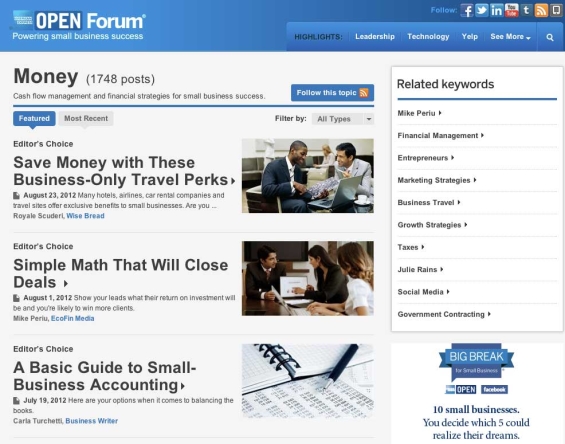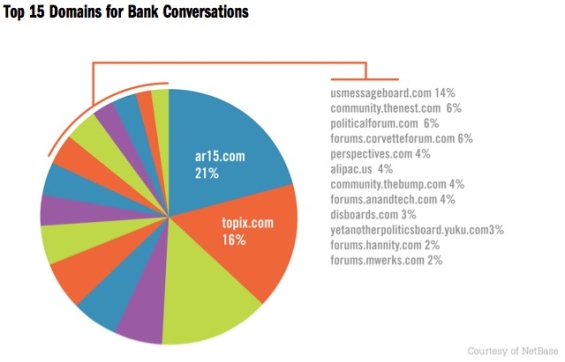When many banks and credit unions search for consumer conversations online, they probably think of Facebook and Twitter… and that’s it. These two popular social networks are the default for most financial marketers. Oh, and don’t forget the occasional blog.
But the truth is that most social conversations around banking take place somewhere else: on old-school social media sites known as “forums” and “message boards.”
Social Media Explorer’s “Conversation Report: What Consumers Are Saying About Banking” took a look at millions of online conversations in the retail banking space and two important insights surfaced for financial institutions (as well as the agencies that serve them).
Key Insight #1: You’re Ignoring a Huge Chunk of the Social Conversation
What is a forum?
An internet forum, or message board, is an online discussion site where people can hold conversations in the form of posted messages. They are like instant chat rooms except that messages are archived for anyone to read at any point in the future. Depending on the forum’s settings, users can be anonymous or have to register with the forum and then subsequently log in in order to post messages. On most forums, you don’t have to log in to read existing messages.
90% of the conversations studied (during the 2011 calendar year) took place on forums and message boards — not Facebook, not Twitter, not blogs.
Did you get that? 90%! Not nine-point-oh. Not nineteen. Ninety!
Financial marketers hoping to engage their customers or prospects via social media and online channels need to realize forums and message boards present an incredible untapped opportunity.
But before you dive in, you need to understand the etiquette and norms of forums. If you don’t know what you’re doing, you could land in hot water. Forums often have strict policies prohibiting blatant promotional activities. At forums that are managed conservatively, that might mean no posts with links, no company- or marketing-related messages, no off-topic comments. For the traditional marketer, this is can be wildly unfamiliar territory. Stingy admins may guard their forums with an ever-watchful eye out for violators. Commit an offense and you could have your account suspended or even closed completely.
Bottom Line: If you pop into a forum and start talking about your products and services, or pushing a bunch of links to your website, people are going to see right through it. Forum users and admins alike will regard you as a spammer, and treat you accordingly. If you really want to have any success in forums, you have to genuinely help people with their questions, issues and needs.

Are You Ready for a Digital Transformation?
Unlock the potential of your financial institution's digital future with Arriba Advisors. Chart a course for growth, value and superior customer experiences.

Why Industry Cloud for Banking?
PwC’s Industry Cloud for Banking helps deliver personalized products and services that today’s customers expect.
Patrick O’Keefe, author of the book Managing Online Forums and a respected expert on forums, offered these pointers to marketers wanting to tap this oft-ignored social media gold mine:
- Understand the community guidelines
- Contribute to the community, not just on the community
- Don’t be the first to mention your stuff
- When in doubt, ask the administrator
The key behavioral change for marketers is simply not leading with the sales pitch. Think of forums like a social club or networking event. Yes, you might get business there, but starting with your sales pitch means most people won’t want to talk to you. Have conversations about what the community is talking about, not your latest greatest deal or promotion.
Some banks maintain their own online discussion forums, like Amex with their OpenForum where small business owners can exchange ideas and insights. BofA has a similar forum for small businesses. And The Financial Brand recently wrote about a student lending forum Wells Fargo launched recently.
Key Insight #2: It’s Not Just Banking Forums
When we looked at the specific domains where banking conversations were taking place, the leading fertile ground was AR15.com – a forum for machine gun enthusiasts.
Consumers talk about a variety of things on forums and sometimes not the main topic area of the forum or website itself. AR15.com is a vibrant community of gun enthusiasts who come together to discuss guns (of course), but they also enjoy carrying on conversations with like-minded individuals on everything from cars to crafts and from sub sandwiches to sub-prime mortgages. It’s not that banking is a topic that leads on AR15.com, it’s just the common thread that binds its members. They feel a certain kinship with others in the community and thus talk openly about anything. Including banks, apparently.
Bank marketers need to look in counter-intuitive places to find the vibrant conversations around their products, services and competition. While XYZ Bank in Tucson may not be the subject of specific conversations about banking, there very well may be people in Tucson talking about bank choices on a forum about crafting somewhere.
Forums like TheFinanceForums.com or AllBanks.org are obvious choices, but sticking only with popular financial forums may severely limit your efforts. Remember, most customers go to the internet to discuss products and services with like-minded people, not pushy bankers.

What Bank Marketers Should Do
The simple steps to incorporating these research insights into your approach to social media marketing are simple:
1. Understand that social conversations seldom start with your products and services. Participate in the chatter that the community has started and just be a relevant voice and perspective first.
2. Be smart about where you look to engage in conversations. Do some research of your own about where people in your community are discussing financial topics online. And don’t focus on solely bank related websites.









